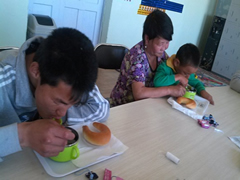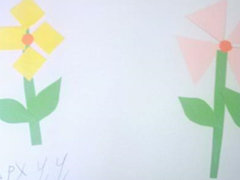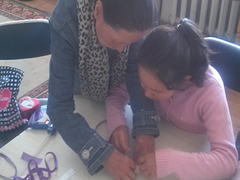- Home
- Technical Cooperation Projects
- Index of Countries
- Asia
- Mongolia
- The Project for Strengthening Teachers' Ability and Reasonable Treatments for Children with Disabilities (START)
- Project News
- Pilot Activities for setting up Special Class at School No.26 in Ulaanbaatar - Everyone can learn at school in community -
Project News
2016-08-03
Pilot Activities for setting up Special Class at School No.26 in Ulaanbaatar
- Everyone can learn at school in community -
School No.26, located in Khan-uul District, Ulaanbaatar city about 35 kilometers from the city center, is a small school with 570 students and 34 teachers (as of March 2016). Some Children with Disabilities (CWDs) who live around School No.26 go to the nearest Special School, Special School No.63. However, Special School No.63 is far away (about 23 kilometers) from School No.26 and there are few local buses. Thus, it is extremely difficult for CWDs who have difficulties with walking to continuously commute to school and some of them drop-out from the school. School No.26 also accepts CWDs but there are some issues such as difficulties of learning activities for children with severe disabilities, re-including drop-out children, and allocating additional teachers to support CWDs.
In 2014/2015, a female teacher in School No.26 (who was working as a maternity leave replacement teacher) and its Social Worker conducted survey on CWDs living around the school. The survey identified 9 CWDs (6 years old to 18 years old) who are not able to go to school. During the survey, most of CWDs said that they were willing to go to school and their parents also wanted to send their children to school. After this survey, teachers of School No.26 started to discuss about setting up special class. At the same time, School No.26 was selected as one of the pilot schools of the Project. Based on the discussion between the Project and School No.26, the Project decided to support School No.26 to conduct pilot activities for CWDs.
School No.26 held a Christmas Party on 20 December 2015 and 4 CWDs, their parents, and some students from School No.26 attended it. All of them enjoyed listening to harmony of recorder played by students and playing games.
Semimonthly pilot activities for CWDs started from March 2016 based on discussion among School No.26, parents, and the Project. However, there were several issues to be solved before starting activities: since the pilot project is not officially sanctioned by the authorities; the issues include CWDs' means of transportation, school lunch, and budget for teaching materials. The female teacher and Social Worker negotiated with relevant stakeholders to solve these issues. Then, School No.26 decided to utilize existing school bus to drop and pick CWDs up. School lunch is to be provided free of cost from school lunch catering provider. A Korean NGO donated towels and tooth brushes and JICA Project Team provided teaching materials, stationeries, and files for individual portfolios.
Six activity sessions were held by June 2016, which is the end of school year 2015/2016. Five CWDs participated in the activities on average and enjoyed learning colors and shapes, numbers, and participating in art activities and making hair accessories. At the end of the series of activities, parents expressed their appreciation to teachers and asked them to continue the activities.
Management team of School No. 26 decided to officially set up a special class and they applied for it to Ministry of Education, Culture and Science and Education and Metropolitan Education Department of Mongolia. Once the request is approved, additional teachers and extra budget will be allocated. The Project Team will continue to support School No. 26 so that CWDs can have opportunities to get education.
 Lunch time
Lunch time
 Learning colors and shapes
Learning colors and shapes
 Making hair accessories
Making hair accessories
 Hair accessory made by children
Hair accessory made by children
- About JICA
- News & Features
- Countries & Regions
- Our Work
- Thematic Issues
- Types of Assistance
- Partnerships with Other Development Partners
- Climate Change / Environmental and Social Considerations
- Evaluations
- Compliance and Anti-corruption
- Science and Technology Cooperation on Global Issues
- Research
- JICA Development Studies Program / JICA Chair
- Support for the Acceptance of Foreign HRs / Multicultural and Inclusive Community
- Publications
- Investor Relations
